

New paridigm crossing humans and machines. Forecast 2020: Web 3.0+ and Collective Intelligence. “We know what we are, but we know not what we may become” – Shakespeare The ancient Chinese curse or saying — “May you live in interesting times.” — is upon us.
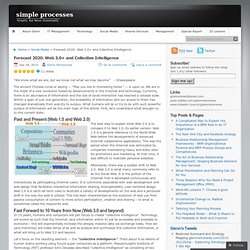
We are in the midst of a new revolution fueled by advancements in the Internet and technology. Currently, there is an abundance of information and the size of social interaction has reached a colossal scale. Within a span of just one generation, the availability of information and our access to them has changed dramatically from scarcity to surplus. What humans will do or try to do with such powerful surplus of information will be the main topic of this article. Past and Present (Web 1.0 and Web 2.0) The best way to explain what Web 2.0 is to compare it to Web 1.0, its earlier version. Afterwards, there was a sudden shift to Web 2.0. Fast Forward to 10 Years from Now (Web 3.0 and beyond) Harnessing Collective Intelligence for Crowdsourced Scenario Planning.
To anyone in or around Cambridge, MA this week, please join me tomorrow for a preliminary dissertation colloquium, in which I present a proposed schema for online, participatory scenario planning systems using crowdsourced or “collective intelligence” approaches.
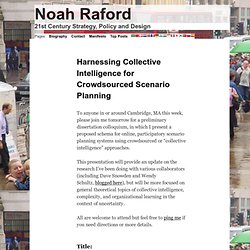
This presentation will provide an update on the research I’ve been doing with various collaborators (including Dave Snowden and Wendy Schultz, blogged here), but will be more focused on general theoretical topics of collective intelligence, complexity, and organizational learning in the context of uncertainty. All are welcome to attend but feel free to ping me if you need directions or more details. Title: Large-scale Participatory Futures Systems: Harnessing Collective Intelligence for Crowdsourced Scenario Planning Summary: Scenario planning is a structured method for exploring planning & design strategy under severe uncertainty and dynamic change. Can this process be reproduced or enhanced through online means? CI capitalising on the crowd. Rise of Crowd Computing (December 2012)
Crowd Computing Makes Use Of Collective Cognitive Surplus. Crowdsourcing vs Collective Intelligence. What's the diff? Thanks to intrepid design blogger, oyster fiend, and “bro”, John DiPalma and his solid blog at DesignRising, I’ve been coerced into writing much richer blog posts about the topics that I’m exploring.
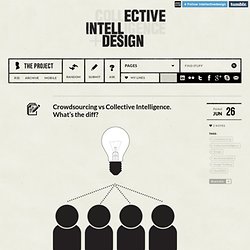
So, here goes the first in a series of attempts to share some meatier topics and the findings that I’m uncovering. As the title of this blog suggests (and if you’ve ventured as far as reading the “Project” section) I’m exploring the role of collective intelligence in design. When I describe my research to people, I usually start with the description of collective intelligence, and then quickly find myself falling back on the more commonly known crowdsourcing. Organization in the crowd: peer production in large-scale networked protests - Information, Communication & Society - Volume 17, Issue 2. How is crowd organization produced?
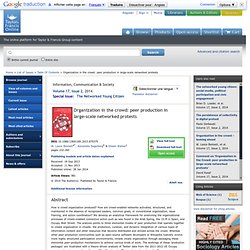
How are crowd-enabled networks activated, structured, and maintained in the absence of recognized leaders, common goals, or conventional organization, issue framing, and action coordination? We develop an analytical framework for examining the organizational processes of crowd-enabled connective action such as was found in the Arab Spring, the 15-M in Spain, and Occupy Wall Street. Crowd computing. Crowdcomputing Eric Brown, co-author of "The Effective CIO", coined the term "Crowdcomputing" in 2009.[1][dubious ] It is an overarching term which defines the myriad of tools that enable idea sharing, non-hierarchical decision making and the full utilization of the world’s massive "cognitive surplus”-the ability of the world’s population to collaborate on large, sometimes global projects. [2] Crowd computing brings together the strengths of crowdsourcing, automation and machine learning.
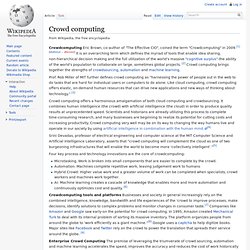
Prof. Distributed Computing. Crowdsourcing and Social Computing. Safwat Ibrahim (Etisalat, Cairo) Abstract: Social networks have grown rapidly in the last years and their usage has become very popular in our daily activities, which motivated many researchers to find out better methodologies and tools for analyzing the human behavior in the social networks in order to use this analysis in different applications such as achieving better customer experience and forecasting human behavior in certain situations.
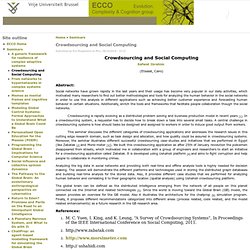
Additionally, enrich the tools and frameworks that facilitate people collaboration though the social networks. Cognitive computing. Knowledge worker. What differentiates knowledge work from other forms of work is its primary task of "non-routine" problem solving that requires a combination of convergent, divergent, and creative thinking.[2] Also, despite the amount of research and literature on knowledge work there is yet to be a succinct definition of the term.[3] The issue of who knowledge workers are, and what knowledge work entails, however, is still debated.
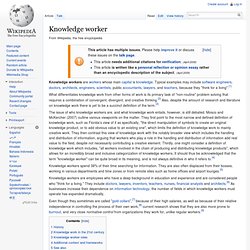
Mosco and McKercher (2007) outline various viewpoints on the matter. They first point to the most narrow and defined definition of knowledge work, such as Florida’s view of it as specifically, "the direct manipulation of symbols to create an original knowledge product, or to add obvious value to an existing one", which limits the definition of knowledge work to mainly creative work. Knowledge workers spend 38% of their time searching for information. History[edit] Savage (1995) describes a knowledge-focus as the third wave of human socio-economic development. See also[edit] #TheoryThursday: COGNITARIAT RISE UP! Ed.Note: A frequent question to the team of the Occupy Solidarity Network is, “Why are you still here?
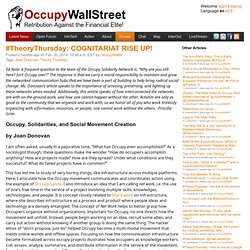
Isn’t Occupy over?” The response is that we carry a moral responsibility to maintain and grow the networked communication hubs that we have been a part of building to help bring radical social change. Ms.